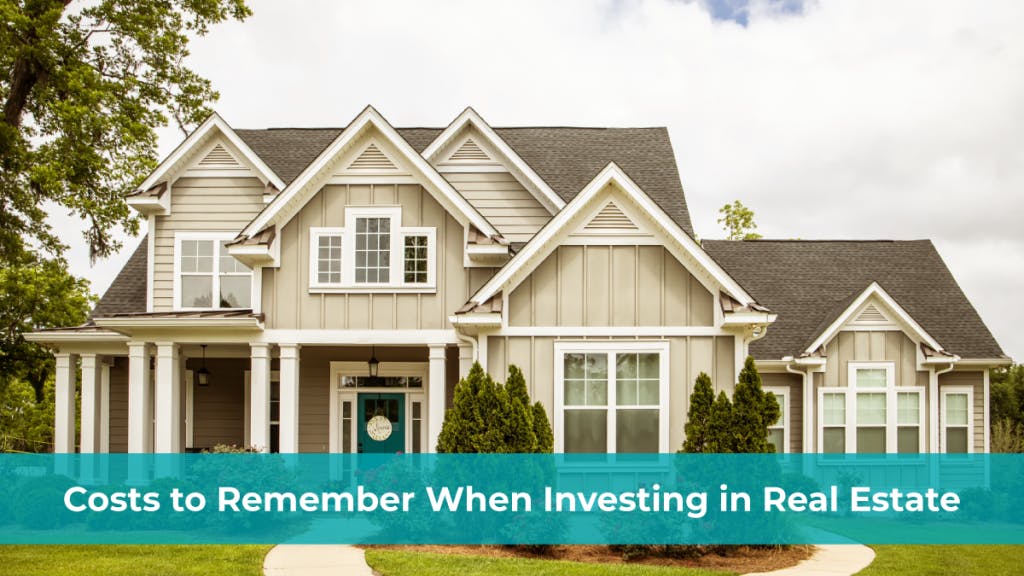Costs to Remember When Investing in Real Estate

Investing in real estate will feel different for first-time real estate investors. This is particularly true for those who have only purchased real estate with the intention of living in the home. This is because home mortgages are governed by a different set of laws than business loans. Also, real estate investing is considered a business.
Moreover, most people do not buy or sell homes more than a few times in their lives. It can be easy to forget all the costs involved in real estate transactions when they have only done it once or twice before.
A bit of research, however, can help you plan for these costs and, possibly, negotiate them down. Here are some examples of costs to remember when investing in real estate.
Costs Unique to Real Estate Investing
Some costs associated with real estate investing are easy to forget because they are not typically encountered in the ordinary purchase or sale of an owner-occupied home.
Real Estate Purchase Costs
Examples of purchase costs that real estate investors typically pay out of pocket include:
- Appraisal: Because the real estate is an investment property, a lender may require an appraisal to ensure that the loan amount is justified by the property value. Hard money lenders, for example, typically approve loan amounts between 65% to 75% of the after-repair value (ARV) of an investment home. The only way for the lender to calculate the risk associated with hard money lending for your project is to have the property appraised.
- Credit report fee: Lenders will often require an application fee or credit report fee to cover the cost of obtaining a credit report on all the borrowers.
Real Estate Carrying Costs
Costs associated with holding real estate are referred to as carrying costs. When real estate is owner-occupied, these are usually considered living expenses. For example, utilities, exterminator fees, and yard care are costs of doing business for a real estate investor. Without utilities, making repairs to the home would be nearly impossible. Additionally, few buyers would be interested in a bug-infested home with an unkempt yard.
Real Estate Sale Costs
Selling real estate can also require outlays of money. The biggest cost associated with real estate investing is capital gains tax. As a real estate investor, you will likely not be eligible for the exemption for the sale of a primary home when you flip your real estate investments. As a result, you will owe the federal government capital gains taxes on the profits of the sale.
Costs Associated with All Real Estate Sales Including Real Estate Investing
In some respects, buying and selling investment property will incur the same expenses as buying and selling your residence. However, a new real estate investor or someone who has not bought or sold a home recently may simply forget about all the costs associated with real estate transactions.
Real Estate Purchase Costs
Purchase costs typically amount to a staggering 2% to 4% of a home’s sale price. These thousands of dollars are itemized at closing. Here are a few examples of fees incurred before or at closing:
- Home inspection: Whether you intend to flip or fix-and-flip a home, a home inspection can help you get a handle on the condition of the home you are buying. You may be able to negotiate with the seller to hire a home inspector at the seller’s expense. However, if the home you are buying is clearly in need of repairs or is being purchased out of foreclosure or at a short sale, you might be solely responsible for paying for a home inspection report.
- Attorney’s fees: Some states require an attorney to prepare the transfer documents. Transactions occurring in one of these states could have attorney’s fees included in your closing costs.
- Origination fee: An origination fee is charged by a lender to open a loan account for the buyer.
- Document preparation fee: A lender typically charges a fee to prepare the loan documents. A lender who did not charge an application fee upfront typically includes its time and costs of processing your loan application in the document preparation fee.
Real Estate Purchase Costs Continued
- Title fees: Title fees cover the cost of researching the title to ensure that the seller has the right to sell the property, transferring the deed to the home, and recording the deed transfer with the county recorder.
- Title insurance: Title insurance covers you and your lender if it turns out the seller did not have clean title to the home.
- Private mortgage insurance (PMI): PMI covers the lender if you default before building up 20% equity in the home.
- Transfer taxes: Some jurisdictions assess a transfer tax on all real estate transfers.
- Prepaid property taxes: Since property taxes are paid in advance, you may be required to reimburse the seller for the percentage of property taxes prorated to the date of closing.
- Flood certification: The U.S. Federal Emergency Management Agency maintains flood maps to identify flood plains. Flood certificates identify whether the home is located on a flood plain for purposes of flood insurance
Some of these fees may be negotiated with the lender or buyer. For example, transfer taxes and attorney’s fees may be shared equally between the buyer and seller. The lender may be willing to discount origination, document preparation, and title fees if you are a real estate investor who works regularly with the lender.
Real Estate Carrying costs
Carrying costs common to both investment property and owner-occupied property. These can include ongoing property tax payments, homeowners association fees, and maintenance and repair expenses. Moreover, lenders will typically require buyers (whether investors or residents) to purchase homeowner’s insurance and flood insurance if the home is on a flood plain.
Real Estate Sale costs
The main cost borne by the seller is the broker fee if a broker is used. By convention, the seller pays a 6% broker fee that is split with 3% going to the buyer’s broker and 3% going to the seller’s broker. Options for reducing the broker fee include representing yourself rather than hiring a broker or hiring a broker at a flat rate in exchange for volume work.
Real Estate Investing Costs Eat into Profitability
While real estate investing can be highly profitable, costs associated with buying, carrying, and selling real estate must be considered when assessing a piece of property. Knowing up front that up to 10% of the property’s sale price could go toward fees could alter the profitability analysis of the property, particularly where repairs are needed.
For insight into the hard money lending costs associated with real estate investing, contact Longhorn Investments.


